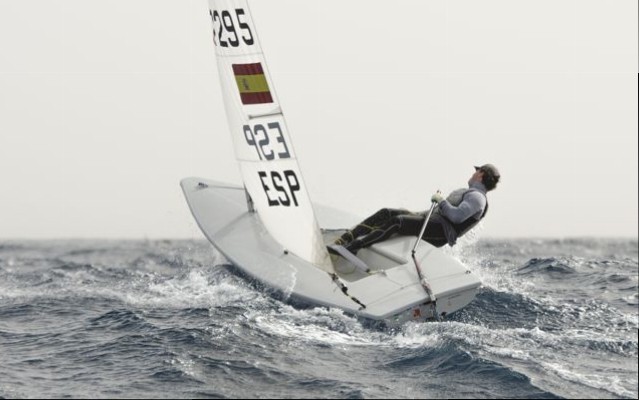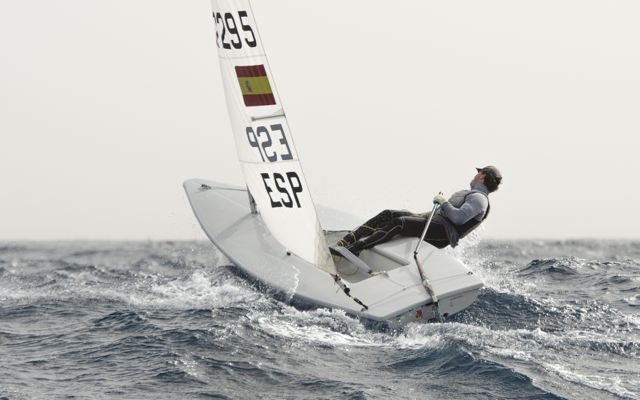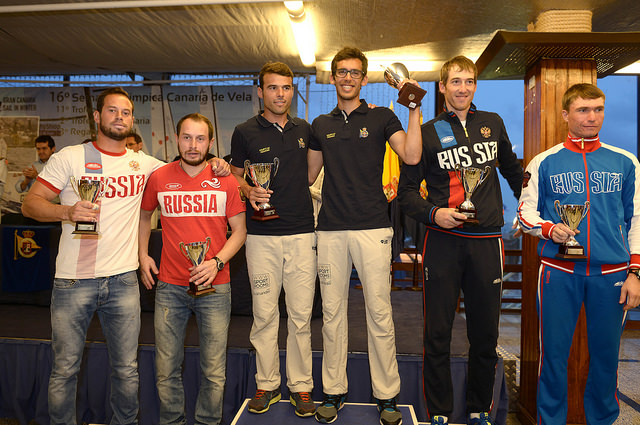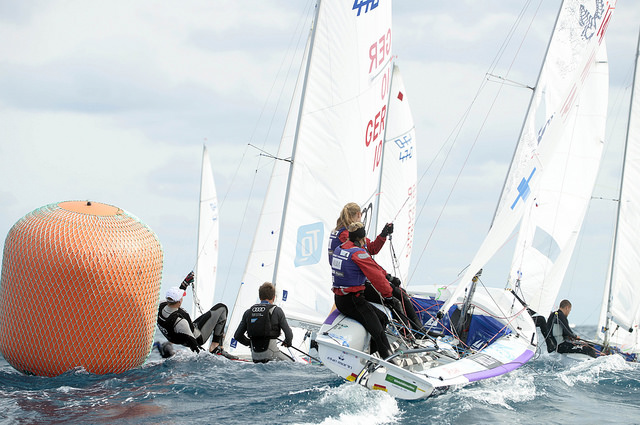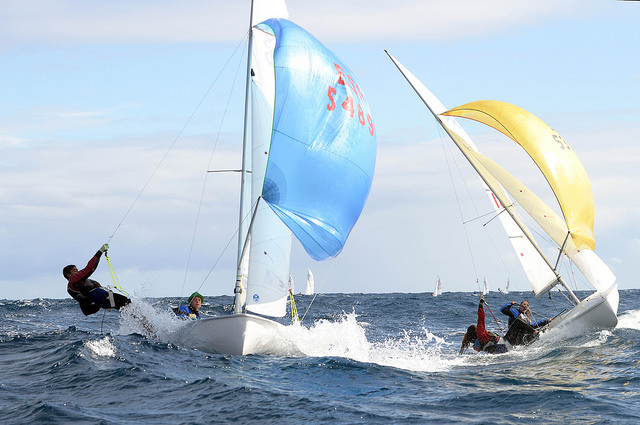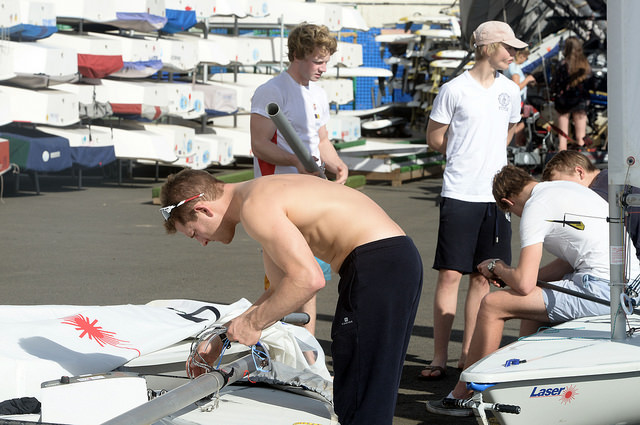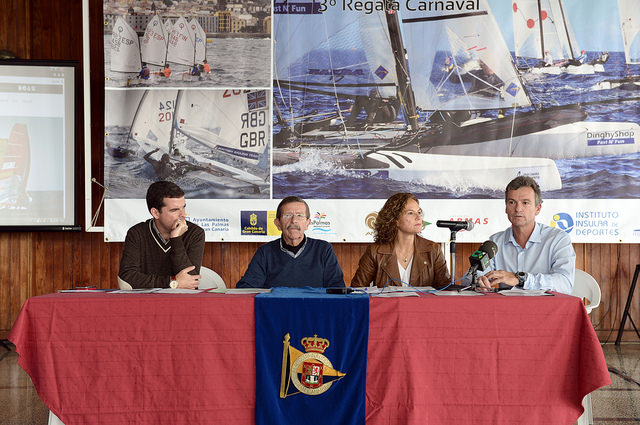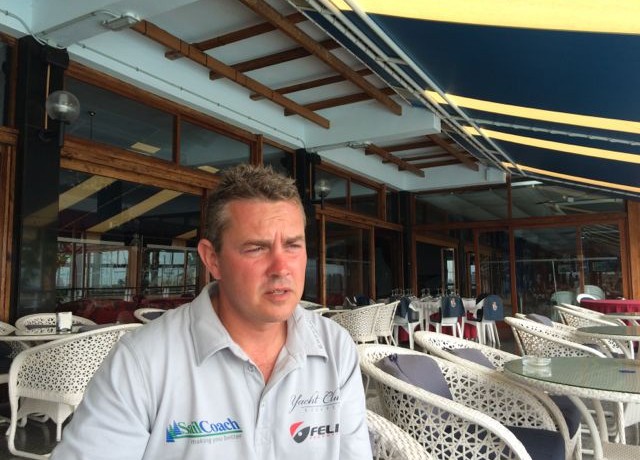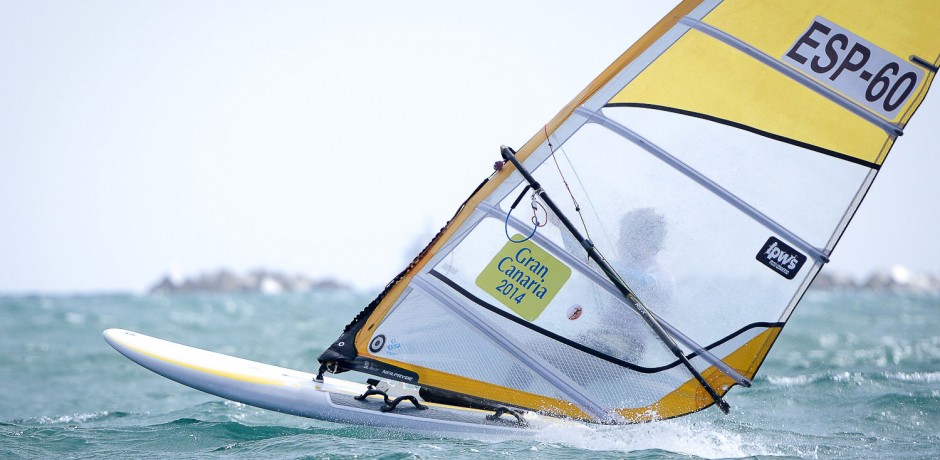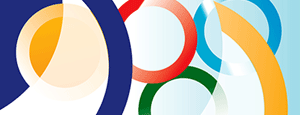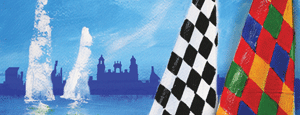Category: 2014
Joaquín Blanco and Joel Rodríguez fought the closest battle on the second day of the International Gran Canaria Trophy (Trofeo Isla de Gran Canaria), which finishes on Sunday in the bay of Las Palmas de Gran Canaria. The two Real Club Náutico de Gran Canaria sailors are evenly matched going into the final day, with a slight advantage for Blanco, who’s jumped from sixth place to the head of the classification table. The pre-Olympic sailor won two of Saturday’s three races.
Representatives from 16 countries are taking part in this international regatta, the third event of the Gran Canaria Sail in Winter programme, which is organised by Real Club Náutico de Gran Canaria with the support of the Gran Canaria Cabildo and Las Palmas de Gran Canaria City Hall.
The weather conditions changed dramatically today for the second day of racing. After starting out with southeast winds of 14-15 knots, the day ended with 10 knot winds, allowing all three scheduled races to go ahead. Sailors also encountered a short wave from the southeast and a long wave from the northeast, which complicated sailing.
The other important news of the day was in Laser Radial, where the lead was taken by Alison Young, Olympic sailor at London in 2012 and member of the British sailing team. Young stole the lead from Canary Islander Luis Cabrera (RCNGC), who dropped to second place and is followed by Chloe Martín, the other British sailor racing this weekend at RCNGC.
In Laser 4.7 the lead also changed, as Patricia Reino (RCNGC) gave up her first place to Alfonso Fernández, from Real Club Náutico de Tenerife. In second place is Carlos Pavillard, also from RCNT.
In 470 Nahuel Rodríguez and Nicolás Rodríguez won the three races during the second day, taking them to first place in the classification for this small fleet, ahead of the Russian and Finnish teams.
In the 2.4mR Paralympic class the Swedes continue to dominate, with Hans Asklund maintaining the lead. The first Spanish sailor classified is Pablo García, in sixth position. The Paralympic class is new to this season’s Gran Canaria Sail in Winter programme and is a step forward for the host club, which is aiming to boost the level of this class.
Techno (boards) had its first day of racing today. Britain’s Joshua Carey is in the lead with a third and two firsts. He’s followed by RCNGC team members Eduardo Santana and Javier Rodríguez. Magüi Suárez, the only girl competing in this class, had a very good start but was penalised for being over the line in the third and final race, finishing fourth.
Three races have been scheduled for Sunday, the final day of competition, and the award ceremony should start at around 16.00 hours. Similar wind and sea conditions are expected, as well as an exciting final in all classes, as the points in the top places are very close.
Photo by Alberto Sánchez
Translated from Spanish by Jane Mcgrath
Real Club Náutico de Gran Canaria has taken the gold in the three premier classes of the 16th Semana Olímpica Canaria de Vela: Onán Barreiros and Juan Curbelo in 470, Joaquín Blanco in Laser Standard, and Kevin Cabrera in Laser Radial. In the new Paralympic class, the gold went to RCNGC sailor José Guerra, who’s about to embark on a challenge that will take him to 15 regattas throughout continental Europe in 2015.
Sailors from 23 countries have taken part in the 16th Semana Olímpica Canaria de Vela, the first event on the new Spanish Olympic series. Spanish Royal Sailing Federation President, José Ángel Rodríguez Santos, and pre-Olympic team manager, Tony Ripoll, travelled to Las Palmas de Gran Canaria to attend the competition.
The participation of representatives from 23 countries was one of the strong points stressed by Mimi González, City Councillor for Ciudad de Mar (Sea City). She said that Las Palmas de Gran Canaria City Council, one of the main supporters of this project, values the way the presence of these young sailors and their coaches and the ripple effect of the social networks help to promote the city as a tourism destination.
Sailing on the final day of this year’s Canary Islands Olympic Sailing Week was once again characterised by strong wind and sea conditions, which allowed all the scheduled races to be run on time.
Joaquín Blanco (RCNGC) has been one of the key figures in the competition. He’s a member of the Spanish Pre-Olympic team, which dominated the field from start to finish. Blanco barely stepped down from the podium. “Today conditions were very stable and that allowed me to secure the victory. A home win is always very special”, he said.
In 470, Onán Barreiros and Juan Curbelo (RCNGC), eighth in the international ranking, are ending the year with a victory they fought the two Russian crews for right up to the last minute. The Russians took second and third spot on the podium.
In the women’s 470, the win went to Mallorca’s Marina Gallego and Fátima Reyes. Russians Alisa Kirilyuk and Lyudmila Dmitrieva came second and the bronze went to Spain’s Ángela Pumariega (Asturias) and her crew member, Gran Canarian Patricia Cantero (RCNGC).
Kevin Cabrera, from RCNGC, took the gold in Laser Radial after a very even battle with Holland’s Benjamin Wempe. Third place went to another member of the RCNGC team, Luis Cabrera, one of the three sailors distinguished at this event by the Spanish Olympic Committee. During the Canary Islands Olympic Sailing Week award ceremony, Cabrera, Gustavo Martín and Patricia Reino received the medals awarded last year by the Spanish Olympic Committee in recognition of their sports achievements.
In the women’s Laser Radial, Lithuanian Viktorija Andrulyte had a strong win. Martina Reino, an RCNGC youth sailor, took the bronze medal. The silver went to Poland’s Agata Barwinska.
Races were held in three categories of board sailing. In RS:X 9.5, Club de Vela Formentera led the field, with Joan Cardona first and Sergio Escandell third. Second place went to Holland’s Matthijs Van’t Hoff.
In the women’s RSX:8.5, the victory went to Pilar Lamadrid, from Club Puerto Sherry (Cádiz), ahead of her two Dutch rivals.
In RS:X 8.5 junior, the Dutch took first and second place, leaving the bronze for Ángel Granda, from RCNGC.
The Olympic Sailing Week closed with the invitation to the 420 class, which included local competitors. The final placings were Elías Aretz/Elio Hoyos (1st), Wichy Hernández /Guillermo López (2nd) and María Caba/Carla Díaz (3rd).
F18 and Nacra 17 were dominated by the Germans.
The award ceremony was held this afternoon.
Translated from Spanish by Jane McGrath
Just four points separate two crews fighting for first place in the 470 class of the 16th Canary Islands Olympic Sailing Week, due to end on Monday in Las Palmas de Gran Canaria’s harbour. Russians Pavel Sozykin and Denis Gribanov lead the race with 22 points, closely followed by Onán Barreiros and Juan Curbelo, from the Real Club Náutico de Gran Canaria sailing team, on 26 points.
Real Club Náutico de Gran Canaria is the organiser of this 16th Olympic Sailing Week, which has brought 200 sailors from 24 countries to the bay in Las Palmas de Gran Canaria. Las Palmas City Hall (Ayuntamiento de Las Palmas), Cabildo de Gran Canaria and private companies Anfi and Naviera Armas are backing the event.
The weather conditions have played a starring role in the first three days of racing. The sea and wind conditions have been very favourable and all the races scheduled have been held. The weather’s expected to remain the same for the fourth and final day tomorrow. Contestants faced 6-10 knot northeast winds today, with some shifts and a swell without strong waves.
Another Russian crew, formed by the Sheremetyev brothers, is just three points behind Barreiros and Curbelo, increasing the tension for Monday’s final.
Back on shore, the Gran Canarian sailors explained they’d suffered “too many shifts in the wind” and had problems with the second close hauls in the two races on this third day of sailing.
In the women’s 470, the Spanish crew of Marina Gallego (Club Náutico La Rápita) and Fátima Reyes (Club Náutico Arenal) moved up to first place. Spain’s Angela Pumariega, from Asturias, and crew member Patricia Cantero, from Gran Canaria (RCNGC), are holding onto second place.
Cantero explained that after the first close haul in the first race, the wind shifts had been tough on them, but in the second heat the wind had let up and things went a lot better.
The considerable Russian presence in this competition, as seen both in the results and the number of contestants, is due to coach Mikhail Zabolotnov’s conviction that “Real Club Náutico de Gran Canaria is the best club in Europe”, as he told television company Panorama Vela. The company has brought a team of professionals to the island to make programmes about the competition for Spanish and international audiences.
In Laser Standard, Joaquín Blanco is not only holding the lead after six races, but is also facing the final day 12 points ahead of his closest rival, Holland’s Yuri Hummel. World youth champion, Joel Rodríguez (RCNGC), is fighting from fifth place.
As in the men’s 470, the difference is minimal in the top places in Laser Radial. Holland’s Benjamín Wempe is just one point ahead of Kevin Cabrera, from Real Club Náutico de Gran Canaria. In third place is Lithuanian Viktoria Andrulyte, who took two firsts on Sunday.
Racing has finished in the Paralympic class, with a victory for local sailor José Guerra, who won seven of the nine races held, taking the victory from his Finnish and French rivals.
In RS:X 9.5 the lead has gone to Joan Cardona, from the Balearic Islands, who’s two points ahead of Holland’s Matthis Van’t Half. The final could go either way.
The Dutch continue to lead in RS:X 8.5. They’re closely followed by Ángel Granda, from RCNGC, who’ll be starting the last day in third place in the overall classification.
In 420, the guest class, the lead has changed. Elías Aretz and Helenio Hoyos (RCNGC) are first equal on 22 points with María Caba/Carla Díaz. Wichy Hernández and Guillermo López have dropped to third place after a penalty for a false start.
Translated from Spanish by Jane McGrath
Monday is the last day. Two races are scheduled for each class. Trophies will be awarded at around 17.00 hours, depending on how the day at sea goes.
Canary Islanders Onán Barreiros and Juan Curbelo climbed to second place in the men’s 470 class on Saturday, the second day of the 16th Semana Olímpica Canaria de Vela, organised by Real Club Náutico de Gran Canaria in the bay of Las Palmas de Gran Canaria.
Two hundred sailors from 24 countries are competing until Monday in the harbour of the island’s capital city.
The Gran Canarian sailors, who are currently eighth in the international ranking, took two firsts and a ninth in Saturday’s three races. The overall classification in this class is headed by Russians Pavel Sozykin and Denis Gribanov, tenth placegetters at the Olympic class World Championship Santander 2014 with a second, a first and a third.
“We started off with a fantastic wind, lots of waves and sun – something you appreciate, especially at this time of year; in those conditions we won the first race”, said Barreiros back on shore.
The Gran Canarian sailor said that in the second regatta he fell into the water at the start and although they fought back, a bad choice in the second haul was responsible for the results.
“The squalls made the race area pretty complicated and although we won the third race, it was hard work”, he said.
The lead in the women’s 470 was taken by Russian crew Alisa Kirilyuk and Lyudmila Dmitrieva, currently in the world’s top 10 in this class. They were followed by the Spanish crew of Ángela Pumariega, from Asturias, and Patricia Cantero, from Gran Canaria.
Pumariega admitted she hadn’t been able to read the race area well due to changes in pressure and the gusts of wind and rain that hit the area throughout the morning.
RCNGC sailor Joaquín Blanco holds his lead in the Laser Standard Olympic class. Only one race was held on Saturday because of the weather conditions, which were characterised by constantly shifting winds, changes in pressure and squalls.
Spanish sailor Jesús Rogel, from Alicante, pushed his placing up to third in the overall classification, after Germany’s Tobías Schadewaldt. World Youth Champion Joel Rodríguez, from Real Club Náutico de Gran Canaria, is holding onto fourth place.
Benjamin Wempe continues to lead in Laser Radial, despite coming fourth on Saturday in the only race held in this class. Alejandro Pérez, from RCN de Tenerife, is in second place and Lanzarote’s Kevin Cabrera is third. Cabrera, a member of the RCNGC team, has won two of the three races held so far, and with the possibility of a discard tomorrow, he’s headed for first place.
Lithuanian Milda Eidukeviciute is dominating the women’s category and is fifth in the overall classification. The first Spanish woman is María Cabrera, in sixth place in the women’s category.
José Guerra, from the RCNGC team, is leading in the Paralympic class for the second day in a row. In board sailing, Spain’s Joan Cardona, from Club de Vela Formentera, is battling it out with Holland’s Matthis Van’t Half. The two sailors are sitting on 7 points each after three RS:X 9.5 regattas.
In the youth RS:X 8.5, the Dutch continue to rule, with Sam Wennekes in first place and Sil Hoekstra coming second. Ángel Granda, from RCNGC, is third, and Pilar Lamadrid, from Club de Mar Puerto Sherry, is third in the girl’s category.
The first regattas in the guest class (420) started on Saturday. The RCNGC crew of Wichy Hernández and Guillermo López is in the lead after three races.
The Nacra 17 and F 18 classes belong to the Germans.
For Sunday, the second to last day of racing, better wind conditions are expected.
Translated from Spanish by Jane McGrath 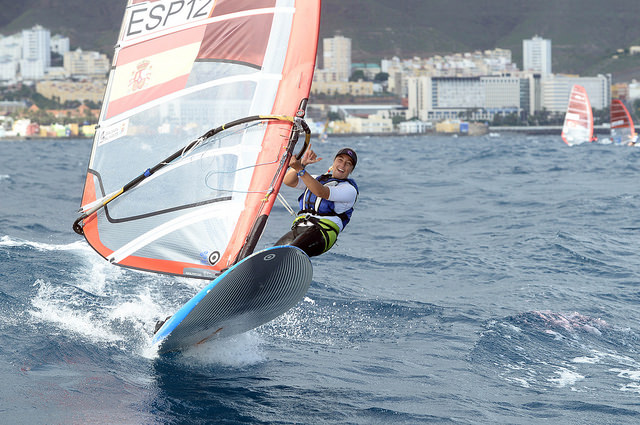
Decisions will start to be made about the Spanish pre-Olympic team in Gran Canaria this weekend during the 16th Semana Olímpica Canaria de Vela. A total of 162 boats from 23 countries (mostly European) are racing in the Canary Islands’ most important dinghy sailing event.
In the men’s 470, RCNGC crew Onán Barreiros and Juan Curbelo, just back from their excellent performance in the Sailing World Cup Final in Abu Dhabi after taking the bronze medal in Qingdao (China), are among the favourites in a high profile event. Barreiros (Spanish competitor at the last two Olympics) and Curbelo are 8th in the current International Sailing Federation (ISAF) rankings.
The race profile also includes Catalonian sailors Jordi Xammar and Joan Herp, who are the current World and European Youth champions, seventh placegetters at Sailing World Cup Santander and gold medal winners at Sailing World Cup Qingdao (China).
Other competitors include Russian sailors Pavel Sozykin and Denis Gribanov (10th in the Olympic class Sailing World Cup Santander 2014), the German Olympic team, and Russians Mikhail Sheremetyev and Maxim Sheremetyev, who represented their country at the last two Olympics.
One of the local competitors is Onán Barreiros, who has Olympic experience and an Olympic diploma. The women’s section also includes competitors from the Canary Islands. RCNGC sailor Patricia Cantero crews with Austurian sailor Ángela Pumariega, gold medal winner in match racing at the 2012 London Olympics.
In the 470 class, six countries are competing: Finland, Germany, Portugal, Russia, Spain and Turkey.
The Laser Standard Olympic class has the highest number of competitors, with 47 boats and sailors from 16 countries. Both quality and quantity can be found at this Canary Islands regatta. Several sailors who’ve already earned a place on their national teams for the Rio Olympics will be taking part, along with two host club competitors who’ll also be in the limelight: experienced sailor Joaquín Blanco and youth sailor Joel Rodríguez. Joel had a spectacular summer competing in the youth category in Laser Radial, winning one European and two world championships.
The focus is also on Poland’s Jonasz Stelmaszyk and Marcin Rudawski, Laser Radial Worlds champion and runner-up. In the Canary Islands, Stelmaszyk is competing in Laser Standard (the Olympic Laser class for men) and Rudawski is competing in Laser Radial.
In the women’s Laser Radial (the women’s Olympic Laser category) the complete winners’ podium from the last Under 21 championship, held in Douarnenez (France), will be racing: Agata Barwinska (Poland), Daphne Van der Vaart (Holland) and Real Club Náutico sailor Martina Reino. Martina, who won the ISAF Youth Worlds in Portugal this summer, is one of the host club’s trump cards.
The 2.4mR class (Paralympic) is making its début during the Canary Islands Olympic Sailing Week. It will also be a first for the new RCNGC team, comprising José Guerra (second in the Spanish series this year) and Javier Ugarte. The Canary Islanders will be competing against four Finnish sailors.
Five countries will be racing in the RS:X class (sail boards) and competition in the catamarans (Nacra and Formula 18) will be between the Germans and Austrians.
Translated from Spanish by Jane McGrath
Sailors from 23 countries will be taking part in the 16th Semana Olímpica Canaria de Vela (Canary Islands Olympic Sailing Week), which was launched on Tuesday at Real Club Náutico de Gran Canaria. The skills level and the number of sailors registered for this iconic race in the Spanish series were deemed “a success” by the Club’s sports manager, Francis Bautista, who highlighted the attendance of sailors who’ve already qualified for the Rio 2016 Olympic Games and countries such as Russia, whose entire teams will be taking part.
The Russian, Lithuanian, Spanish and Portuguese Olympic teams and the Norwegian, Dutch and Turkish youth teams have brought all their members to the event in Gran Canaria.
The Semana Olímpica Canaria de Vela is the first event on the Spanish calendar that will count towards entry into the Spanish Pre-Olympic sailing team. Several of the Club’s sailors, such as Onán Barreiros and Juan Curbelo in the 470 class, Joaquín Blanco in Laser Standard, and Martina Reino in Laser Radial, will be working for their places over the long weekend of the race.
Lucas Bravo de Laguna, Head of Sports with the Gran Canaria Cabildo, and Mimi González, City Councillor for Ciudad de Mar (Sea City), were at the launch to represent the two local bodies sponsoring the race, described as the “the Club’s most important event of the year” by Club President Óscar Bergasa, who led the press conference.
The Olympic Sailing Week is the longest-running event of the four races in the Gran Canaria Sail in Winter programme. After this race, which will be held from 4 to 8 December, the Gran Canaria club will be holding the Optimist Trofeo AECIO (26-29 December), Trofeo Isla de Gran Canaria (9-11 January) and the Regata de Carnaval (13-15 February).
One of the main innovations this year is the decision by European Region of International Laser Class Association (EurILCA) to start the Europa Cup series with the Regata de Carnaval Ciudad de Las Palmas de Gran Canaria. This has boosted the interest of Europe’s top teams in taking part in the final race of the Gran Canaria Sail in Winter programme.
The RCNGC President announced that, for the first time, the Club is including Paralympic sailing in its winter races. The Club already has its team, comprising sailors Javier Ugarte and José Guerra, and several other European crews have confirmed they’ll be competing in Gran Canaria this winter.
City Councillor Mimi González, who sailed at the 1988 Seoul Olympics, highlighted the Council’s support for the Gran Canaria Sail in Winter programme and its importance for the city, which is promoted as a winter sailing base.
González said that the 2013 Olympic Sailing Week, in which 374 sailors took part, had brought in half a million (489,780.72) euros to the city of Las Palmas de Gran Canaria. For the 2013 Gran Canaria Sail in Winter programme, 689 sailors from around 20 countries came to Gran Canaria and the city earned 900,000 (892,747.62) euros, in figures announced by the councillor.
“At the Gran Canaria Cabildo we’re delighted to support the Semana Olímpica Canaria de Vela, which has become a well established event”, said Lucas Bravo, who added that “the idea of the Gran Canaria Sail in Winter programme is fantastic for promoting the island abroad”.
In addition to defining Real Club Náutico as a symbol of Gran Canaria, Bravo reiterated the support of the Cabildo and confirmed the ongoing collaboration of the public institution.
Technical data
Sailors from 23 countries have registered.
Races will be run in two race areas:
- The first will be for the Laser class races (Radial and Standard) and 2.4 mR (Paralympic sailing).
- In the second race area, the 470 class, catamarans (Nacra and F-18) and RS:X (sail boards) will be competing.
The Olympic Week races will be held from 5 to 8 December, with three races a day starting at 11.00 hours.
(Translated from Spanish by Jane McGrath)
Tamas Eszes, coach of the Hungarian sailing team, talks about Gran Canaria. Eszes and 16-year-old sailor Maria Erdi are already training at Real Club Náutico de Gran Canaria. The Hungarians were the first team to arrive this season.
Why did you choose Gran Canaria for training?
Last year we had an invitation from the club for the Olympic Sailing Week, but we were training in Valencia for the winter and decided to come to the island for just one week. It was the first time we’d visited this club and the area and we had a great time.
Your team is the first to arrive. Why are you here so soon?
After Santander, there are really no more big races in Europe, just a few Europa Cups, but we decided not to do them. We wanted to start training for the next season and we were looking for a place like this, where everything we need is in one place: a gym, swimming pool, great weather, sailing area, good wind. In this one location we aren’t wasting time every day going from one place to another. We do all our training sessions at the Club and that’s just perfect.
How long are are you staying?
My sailor is quite young. She studies at a private school, which means she doesn’t need to attend class every day. She only needs to do the exams and she sat four subjects in September. We decided to stay in Gran Canaria for two months, until the end of the Olympic Sailing Week, and then she’s going to take a month off to sit the exams for the six remaining subjects. Then she’ll come back to Gran Canaria in January and continue training.
Will you be taking part in the Gran Canaria Sail in Winter series?
Of course; we’re going to do all the races in Gran Canaria. We hope the Club will organise the Laser Europa Cup in February. That could be the first Europa Cup of the year and I think a lot of sailors and national teams are planning to come to Gran Canaria.
With summer yet to begin, the Real Club Náutico de Gran Canaria (RCNGC) has already started gearing up for the winter sailing season and sent out its first invitations.
Dates have been set for the four international events the RCNGC will be hosting from December 2014 to February 2015: Semana Olímpica Canaria de Vela – Trofeo Real Club Náutico de Gran Canaria, from 6-8 December; Trofeo Internacional AECIO, from 26-29 December; Trofeo Isla de Gran Canaria, on 10 and 11 January, and Regata de Carnaval, Ciudad de Las Palmas de Gran Canaria, on 14 and 15 February.
During the coldest months of the year, when one half of Europe’s shivering and the other half’s freezing, some of the world’s best sailors choose the waters of Las Palmas de Gran Canaria for their winter training because of the excellent sailing conditions and spring-like temperatures.
In December 2013 alone, 18 countries sent their national or Olympic teams to train and compete in the bay of Gran Canaria’s capital city.
Many teams follow the example of the British RS:X team (whose members include Nick Dempsey, silver medallist in London 2012), spending several months in Las Palmas de Gran Canaria with the occasional trip home for competitors.
Spanish women’s RS:X medal winner Marina Alabaú and Australian Darren Bundock (14-time world champion, two-time Olympic medallist and winner of the 2013 America’s Cup in the Oracle class) are some of last season’s names. After her experience on the island, Alabaú announced through a local newspaper in February that she’d definitely be swapping Brazil for Gran Canaria for winter training. Alabaú praised the weather conditions in the sailing area, the comforts and conveniences of Las Palmas de Gran Canaria, and the proximity to mainland Spain.
Countries that have sent their sailors to train and compete in the waters of Las Palmas de Gran Canaria include Russia, Lithuania, Finland, Sweden, Italy, Portugal, Norway, Denmark, Germany, Poland, Iceland, Canada, Turkey, the United Kingdom, Holland, Slovenia, China (Hong Kong) and Peru.
In the 2013/14 season, national and Olympic teams in the Laser, 470, R:SX and Nacra 17 classes came to train in the city’s bay.
Do not miss our photo albums and best shots!
Our visit any of our previous edition photo-albums:

